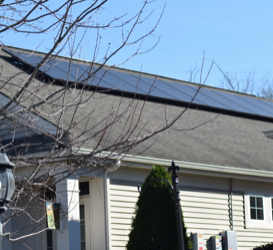By Andy Furman
NKyTribune reporter
Dan Decker claims he’s retired.
Please – don’t believe him.
He’s working daily – to save the planet.
“Global warming,” he told the Northern Kentucky Tribune, “is serious stuff.”
The 66-year-old Decker who worked as a carpenter and later sold pharmaceuticals, was forced into an early retirement when he developed nerve damage in his back.
“Most of my days,” he says, “are on the couch. It’s difficult for me to stand up for a long period of time.”
And while on the couch, well, that’s how he came to understand the environment – in particular – Global Warming.

Dan Decker
“I was watching a Netflix series,” he recalled, “and was told 50 percent of the earth’s coral reefs died over the past 30 years.”
By 2070, Decker says, those reefs may all be gone.
So, what did Dan Decker do?
“I went out and purchased an electric vehicle,” he said. “It simply produces less carbon.”
The Cold Spring resident wasn’t too concerned with burning too much energy as he trekked to Tri-County in Cincinnati to make the purchase — and get the best price.

Next – he dove deep into his pockets, and shelled-out $14,751 for solar panels to add to his patio home.
“I paid cash for nine panels, and they’re guaranteed for 20 years,” he said. “I did it, because I know global warming is getting worse.”
Decker says since early last April, as the Northern Hemisphere has tipped toward the sun, his panels have produced more energy than I have used in each month – and that includes charging my electric car.
He says he’s now built-up energy credit with Duke Energy.
Here’s how:
If Duke Energy charges .08 cents for a kilowatt of electricity, Decker gets the same credit for every kilowatt of electric energy he produces.
“That’s called net metering,” Decker, an NKU graduate who majored in history, said.
“Electricity chooses the path of least resistance. When I produce more energy than I am using, it simply goes back to the grid,” he said. “My meter recognizes this and an arrow on the meter will point towards the street in that case.

“If I am using more energy than at any time – let’s say at night – then the arrow points away from the street.”
Duke charges Decker $13.41 plus-tax each month even when he’s not using any of their electricity.
“In a very real sense,” he said, “Duke is my back-up battery at night when I am not producing energy.”
According to Decker’s calculations, he’s produced over 2,000 kilowatts of electricity that have gone back to the grid.
How does he know this?
“Because,” he said, “Each month it’s reflected on my bill. As we get into winter, I will begin to use more electricity from Duke, probably until next April.”
Dan Decker claims to be retired – but he also manages to make a few trips a-week to the Cincinnati Association for the Blind and Visually impaired, where he volunteers.
But he may very well be seeing the future from his solar-powered home in Cold Spring.
























